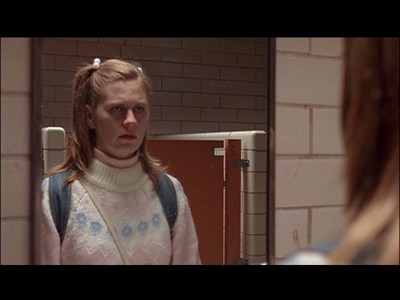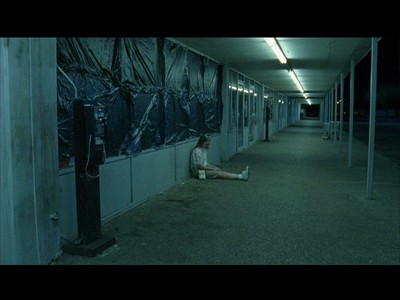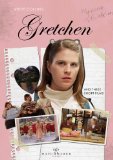| Reviews & Columns |
|
Reviews DVD TV on DVD Blu-ray 4K UHD International DVDs In Theaters Reviews by Studio Video Games Features Collector Series DVDs Easter Egg Database Interviews DVD Talk Radio Feature Articles Columns Anime Talk DVD Savant Horror DVDs The M.O.D. Squad Art House HD Talk Silent DVD
|
DVD Talk Forum |
|
|
| Resources |
|
DVD Price Search Customer Service #'s RCE Info Links |
|
Columns
|
|
|
Gretchen
Other // Unrated // October 27, 2009
List Price: $24.98 [Buy now and save at Amazon]
 At first, "Gretchen" seems little more than a quirky, self-aware portrait of a weirdo, ready to laugh loudly at the social awkwardness of its title character: the nerdy clothes, the nervous tics, the all-around loser-ness of her. But then, we realize just how much the movie likes Gretchen, and how much it's genuinely interested in making her a complete character, not just a laughable caricature. This is a movie that digs for the reality within the comedy, eventually discovering a sweet sincerity that wins us over, and how.
At first, "Gretchen" seems little more than a quirky, self-aware portrait of a weirdo, ready to laugh loudly at the social awkwardness of its title character: the nerdy clothes, the nervous tics, the all-around loser-ness of her. But then, we realize just how much the movie likes Gretchen, and how much it's genuinely interested in making her a complete character, not just a laughable caricature. This is a movie that digs for the reality within the comedy, eventually discovering a sweet sincerity that wins us over, and how.The film marks the feature debut of writer/director Steve Collins, who expands on story and character ideas he originally crafted for two short films. Like those shorts, "Gretchen" stars Courtney Davis in the title role, a nervously sweet outsider, the quiet dork in the back of the class who's fumbling her way through high school. It seems like a gimmick to cast grown-up Davis as the uncomfortable teenager, but it's only a few minutes before her performance grows on us so completely that we buy into this.
The same goes for the rest of the cast, all filled with adults. John Merriman plays Ricky, the chain-smoking, eff-the-world burnout who's inexplicably captured Gretchen's heart. In another movie, this would be the joke: goodie-goodie Gretchen and biker moron Ricky as an improbable duo, and ain't that a hoot? But watch what Collins and his cast do with the idea instead. This is a film interested in the emotions behind such a couple, and "Gretchen" becomes a study of women (young and old) who allow themselves to fall for loser guys.
Collins employs a simple but highly clever trick here, where all the men in Gretchen's life look alike - there's Ricky, then other possible-crush Nick (Macon Blair), and finally her dad Herb (Stephen Root), all of them pudgy, with stringy, long hair and a vapid mouth-breather gaze. You can read this either of two ways: Gretchen is falling for guys of a similar "look," or Collins is using visual cues to playfully suggest the similarities between the men in her life.
Indeed, when one character asks Gretchen if she knows what a "pattern" is, we giggle because we've already seen her emotional loop in action: Gretchen falls for the wrong guy, the wrong guy mindlessly cheats on her, she snaps. When we meet Herb, we suddenly understand that Gretchen's overbearing mom (Becky Ann Baker) was once the same way, which allows us to see into Gretchen's own possible future, where she's knocked up by a guy who doesn't care and who skips out the first chance he gets. (Note that by the end of the film, Ricky is trying his best to convince Gretchen into condom-less sex. Could this be how mom and dad started out?)
(By the way, why is a girl like Gretchen so obsessed with a guy like Ricky? It's never explained. My best guess is that Ricky was the first boy to notice her, probably seeing her as someone he can boss around and talk into a make-out session, while she misconstrues, assuming they're in love.)
As a movie reminiscent of such comedies as "Napoleon Dynamite" and "Welcome to the Dollhouse," it must be noted that while "Gretchen" is very, very funny throughout, it's never mean-spirited, at least not toward Gretchen herself. Yes, there are times she does funny things, but we're never asked to laugh at her, especially never just because of her mere Gretchen-ness. Compare that to "Napoleon Dynamite," whose entire intent was the point-and-laugh routine. Here, Collins saves his pointing and laughing for the jerks who surround Gretchen; legitimate sympathy is given to Gretchen and others like her.
Consider the section mid-movie where Gretchen is shipped off to a home for emotionally disturbed teens. This would be the opportunity to guffaw at the outcasts' expense, what with all the mumbling freaks and geeks. But Collins designs most of these characters to be actual people with actual problems; the only ones that make us laugh are the ones who bring it on themselves by copping an attitude, like when Nick quotes Pink Floyd then drags Gretchen to the world's lamest "rave," held in a strip mall. We're allowed to laugh because he's a self-made loser, a jackass of his own creation.
Daringly, Collins slowly steps away from the laughs as Gretchen's journey moves forward. Rather than avoid (or mock) emotional depth, the screenplay revels in it, eagerly looking into Gretchen's heart, begging us to root her on as she realizes she doesn't have to be trapped by wrong men and wrong choices. (Note: Major spoilers the rest of this paragraph.) The final scene is equally risky in its bittersweet tone. The script sets us up for a crowd-pleasing cheer as Gretchen defiantly cold-shoulders Ricky when he picks her up for the prom, a scene even more satisfying since her mom is at her side, head held high as she drives her daughter toward a better, jerk-free future. But look at that last shot, where we see Gretchen sitting by herself, the prom wallflower. Is she happy being alone? Is this a brave display of inner strength? Or will her alone-ness drive her back to her old ways? A lesser film would either end with her final farewell to Ricky or with her celebrated by classmates; "Gretchen" ends more crypticaly, and it's all the better for it.
Intriguingly, the film's soundtrack grows right along with Gretchen. The movie starts with heavy use of classical music, but presented in the sort of simple arrangements you might hear at a recital, perhaps performed by Gretchen herself. Later, similar pieces are heard, but now they're more complex, mirroring Gretchen's own newfound maturity.
The film is swimming with terrific performances - Merriman is deliciously sleazy, Baker brings great depth to what could've been a bland character, and Root displays his comic genius by merely adding some icky quirks to his line readings - but chief among them is Davis, who lifts Gretchen beyond one-note cartoon. Again, we ponder what a lesser film would've done with the role, not thinking of the character beyond frumpy clothes and off-center naivete. Davis, however, seeks more, getting deep inside Gretchen the person, celebrating her weirdness and the authenticities within. It's obvious Davis actually cares for Gretchen, which allows us to do the same.
 The DVD
The DVDVideo & Audio
While labeled "16:9 anamorphic" on the DVD cover, the film is actually presented in a flat letterbox format (1.85:1). Collins' choice to shoot on 16mm film pays off in this transfer, with its crisp, lively colors and surprisingly sharp detail. (Grain pops up in one darkly lit scene, but that's passable.) The movie's meticulous color scheme (lots of soft pinks in Gretchen's world, compared to fuller, darker colors around other characters) also comes through splendidly here.
The stereo soundtrack is effective in its simplicity. Dialogue comes through clearly, and the music sounds flat-out fantastic. Subtitles are not included.
Extras
A 16-page booklet packaged within the keepcase features two essays in which the DVD distributors trace their discovery of the film; a director's history of the project; and an interview with Collins. It's a lovely little book (and a clever little package, too, with artwork that features convincing doodles from Gretchen herself).
On the disc itself, we get Collins' three previous short films made prior to "Gretchen." Dating back to his film school days, "Lonelyland" (15:25; 1.33:1 full frame) is a big ball of cute sadness (or sad cuteness?), with Merriman struggling his way through a world of sweatpants-clad sad sack loners - until he falls for Davis; it's twice as long as it needs to be, but then, aren't all student films?
"Gretchen and the Night Danger" (26:40; 1.78:1 flat letterbox) introduces us to Gretchen. It's sort of a first draft of a character, with much of the Gretchen-Ricky relationship laying the foundation of what becomes the feature. Added here is a lengthy dance recital where the ballet mirrors Gretchen's romantic ills. It took me a while to warm to this finale since it's so separate from how the feature progresses, but really, as its own piece, it works quite nicely.
Our heroine returns in "Gretchen and the Wolf Wizard" (23:27; 1.33 full frame/1.78:1 flat letterbox), this time falling for bad boy Nick (played, of course, by Merriman). It's not as engaging as the previous works, perhaps because (as Collins explains) the film is unfinished, abandoned when the opportunity arose to make the feature. We're left with a collection of clever moments but no real whole.
All three shorts were shot on DV (and look a little rough for it) and include optional commentary by Collins, who explains how all four titles fit together as a complete piece, while also charting his progress as a filmmaker.
Final Thoughts
Disregard the non-anamorphic transfer if you can, and "Gretchen" on disc becomes a wonderful little package. The feature is a daring, original, and ultimately very touching work, while the three shorts act as a true compliment. Recommended.
|
| Popular Reviews |
| Sponsored Links |
|
|
| Sponsored Links |
|
|
| Release List | Reviews | Shop | Newsletter | Forum | DVD Giveaways | Blu-Ray | Advertise |
|
Copyright 2024 DVDTalk.com All Rights Reserved. Legal Info, Privacy Policy, Terms of Use,
Manage Preferences,
Your Privacy Choices | |||||||














